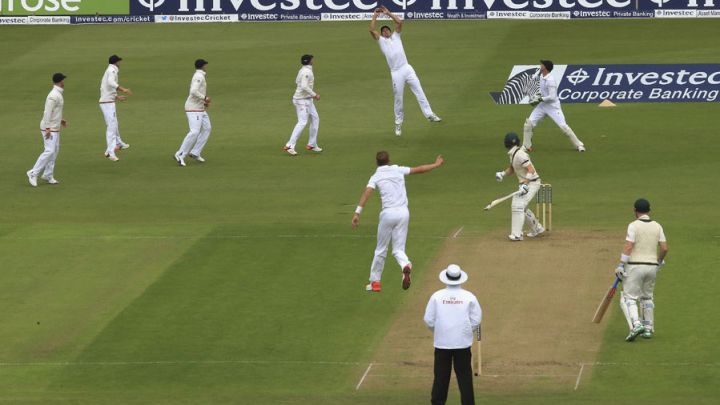Brickbats and bouquets
Alastair Cook and Michael Clarke will experience very different fates as Ashes captains with the series settled. But as The Times On The Ashes collection shows, captains have been praised and pilloried from 1877 to the present day

A collection of Ashes writing in The Times captures the attention placed upon Ashes captains since the contest began. Perhaps Michael Clarke can take solace in that as his attempt to retain the urn ends in failure
Warwick Armstrong (Australia):
Fifth Test, The Oval, 1921
Mr Armstrong took up his position on the furthest boundary, by the Vauxhall entrance, and declined to move either at the end of an over, or when the ball came his way. But he did once run quite fast when Mr Fender hit a 'balloon' of Mr Mailey. He got under the ball and brought off a distinctly good catch. None can say whether he continued to direct the tactics of the side telepathically, or whether the bowlers put themselves on by lot.
ACM Croome
Don Bradman (Australia):
Fifth Test, The Oval, 1948
Bradman's captaincy has a reason which only the cultured observer can follow
RB Vincent
Raymond Illingworth (England):
First Test, Brisbane, 1970-71
On a day when England were never more in need of strong and forthright leadership, Illingworth was seldom conspicuous. If, through it all, he was thinking shrewd thoughts he was not acting on them. Rightly or wrongly, Cowdrey at slip appeared to be taking a keener interest in the tactical implications of the play.
John Woodcock
Bill Lawry (Australia):
Fifth Test, Melbourne, 1970-71
Lawry is one of those captains who seldom departs from the conventional… Cricket, as Lawry and Illingworth play it, is less full of surprises than it need to be.
John Woodcock
David Gower (England):
Fifth Test, Edgbaston 1985
I hardly think that it is ever likely to happen again that the first over of a Test match against Australia, with England in the field, will be bowled by someone with a new blond rinse, wearing a Rastafarian wristband and operating to two long legs. We know Botham is a law unto himself, but this was a bit much even for him. I am afraid that it reflects no better on Gower than on Botham if he thinks that the way to take wickets on this Edgbaston pitch is with long hops - because that is all they were.
John Woodcock
Graham Gooch (England):
Fourth Test, Headingley 1993
Gooch the captain believed that his example which was consistently impeccable should be enough for anybody to follow. What he could or would not do was to make allowances for those whose ways were different. This alienated Gower and Tufnell, among others, and led to a suspicion that Gooch's England was a mechanical side, stripped of joy for the sake of conformity
Alan Lee
Michael Atherton (England):
Sixth Test, The Oval, 1993
However ably he handled his players during his first Test win as England captain, Michael Atherton's savoir faire at the subsequent press conference exceeded the normal call of duty. An encounter with a tabloid journalist who appeared to be under the misapprehension that he was questioning the manager of a lower division football club, represented the greatest chasm of IQ since Isiah Berlin last greeted his dustman.
Michael Henderson
Ricky Ponting (Australia):
First Test, Cardiff 2009
Captaincy is in the main not a public event - it is the leadership in a dressing room, in a hotel, on a team bus, at training. And, in this respect, Ponting is, from all accounts, far better than he was.
Ponting is no arm-around-the-shoulder captain with a degree in people, the famous Bachelor of Brearleyism. In his early years, he could be terse, gruff, not from lack of feeling, but because the expression of it did not come naturally.
Gideon Haigh
Andrew Strauss (England):
Fourth Test, Melbourne, 2010-11
Thrust into the job at short notice after a couple of periods of babysitting, he had to work in the opening few months to create a culture of self-sufficiency. It is ironic how this tour has come to be seen as the apotheosis of the culture of coaching, but Strauss' first message to the players was that they had become too soft and reliant on outside help.
Michael Atherton
Michael Clarke (Australia):
First Test, Brisbane, 2013-14
The image of Clarke the batsman undone by a Stuart Broad sucker punch on day one was replaced by Clarke the all-knowing on day two; Clarke the sorcerer, Clarke the aggressor, as he stood by the stumps under his sunhat, directing the field, seemingly in control of his destiny once again.
Michael Atherton
The Times on the Ashes
Edited by Richard Whitehead
The History Press
381 pages: £20)
Read in App
Elevate your reading experience on ESPNcricinfo App.